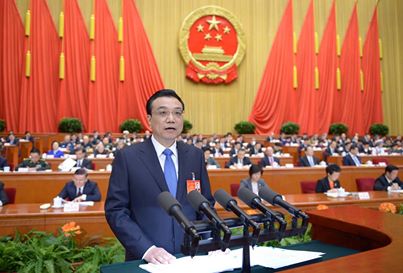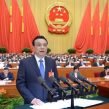
National Security Trumps Reform at the NPC
Publication: China Brief Volume: 14 Issue: 5

Domestic and international security concerns have dominated the on-going session of China’s legislature, the National People’s Congress. This is despite high expectations that Premier Li Keqiang will unveil thorough-going economic reforms in his maiden Government Work Report (hereafter Report), which was delivered at the Great Hall of the People on March 5. A substantial portion of the Report was devoted to issues relating to foreign-policy, military and weiwen (“uphold stability”) measures, which fall within the purview of President Xi Jinping. Following supremo Xi’s oft-repeated dictums, Li indicated that the People’s Liberation Army (PLA) and the People’s Armed Police (PAP) “must ceaselessly raise their deterrent and actual combat ability under conditions of informatization” (Xinhua, March 5; China News Service, March 5). The weiwen imperative has also been thrust into the limelight in the wake of the terrorist attack in Kunming on March 1, in which 29 Chinese residents were killed by a handful of suspects that Beijing has identified as Uighur extremists (People’s Daily March 4; Ming Pao [Hong Kong], March 4). “We must speed up the construction of a modernized armed police capacity,” Li said in the Report, adding that this force would be deployed to fight terrorism, maintain stability and tackle emergency incidents at home.
It was announced at the parliamentary session that the 2014 defense budget would be RMB 808.2 billion ($132 billion), or 12.2 percent over that of 2013. By contrast, military expenditure in 2013 rose at the slightly lower rate of 10.7 percent. While Premier Li’s portfolio is the economy, not military affairs, his Report methodically laid down the rationale for a leap forward in defense modernization. Li put priority on modernizing the PLA’s logistics facilities and military R&D, especially “the development of high-tech weapons and equipment.” Most significantly, the premier noted that a strengthened military capacity was needed to defend China’s expanded core national interests. “We will resolutely safeguard China’s sovereignty, security and development interests,” Premier Li said. “We must place war preparations on a regular footing and boost … the defense of [land] borders, as well as maritime and air boundaries.” The premier also highlighted China’s ambitions to become a “strong maritime power” and the commensurate goal of “protecting China’s maritime rights.” Li’s emphasis on “developmental interests”—which include a reliable supply of oil and gas—as well as “maritime rights” seems to indicate that Beijing will substantially boost its hard power projection in the East China Sea and the South China Sea.
Equally significant is the fact that the Premier has highlighted China’s role as a responsible player on the world stage. “China will fulfill the function of a responsible major power in [handling] important international and regional affairs and flashpoints.” Li further pledged to “earnestly safeguard international equality and justice.” One example cited by Li is that Beijing would “safeguard the victory of World War Two and the post-war international order, and will not allow anyone to reverse the course of history.” While the reference to the Second World War appeared to be a self-serving swipe at what Beijing regards as Prime Minister Shinzo Abe’s efforts to “re-militarize” Japan, Li’s statement about China’s global responsibility reflects President Xi’s belief that the PRC’s enhanced international footprint must be backed by solid defense forces (Phoenix TV News [Hong Kong], March 5; Reuters, March 5).
Senior officials and NPC deputies in Beijing have further elaborated on Beijing’s emphasis on using military force to back up its diplomatic efforts. NPC spokesperson Fu Ying pointed out that while Beijing would stick to the overall principle of good neighborliness, it would not hesitate to employ tough tactics to uphold its rights. “If some countries wish to provoke or wish to damage … regional peace and the regional order, then we must make a response, and an effective response at that,” said Fu, who is a former vice-foreign minister. Also speaking on the sidelines of the NPC, Major-General Yin Zhuo, a popular TV commentator, argued that military personnel should “draw up a strategy on cyberspace to guard national security.” Pointing to the newly set up Central Internet Security and Information Leading Group, whose purpose was to defend China’s Cyberspace, Yin hinted that more resources would be spent on improving the PLA’s cyber-warfare capacity (People’s Daily, March 4; China News Service, March 4).
At the opening of the NPC session, the 3,000-strong delegates observed a minute’s silence to show their solidarity with the victims of the Kunming attacks, which some domestic media have dubbed “China’s 9/11.” Li indicated that the party and state apparatus would boost social management and improve law enforcement. “We will crack down hard on violent crimes of terrorism, safeguard China’s national security, create good public order and work together to ensure public security in China,” he said. In impromptu remarks about the Kunming incident, Li indicated that the authorities would “resolutely crack down on violent criminals who have challenged the base line of human civilization….so that a peaceful China can be built.” Unlike previous years, the Li cabinet did not release the full weiwen budget for 2014. In 2013, this outlay was RMB 769.08 billion ($125 billion), which was even bigger than the PLA budget of RMB 740.62 billion ($121 billion) for that year. An item called “appropriation for public security” was publicized at the opening of the NPC, which came up to RMB 205.07 billion ($34 billion). This figure is believed to be only part of the expenses incurred by the national law-enforcement apparatus (RTHK News, March 6; Radio Free Asia, March 5; BBC Chinese Service, March 6, 2013). More details about the Xi-Li administration’s strategy on combating destabilizing social elements may be made public after the newly established Central National Security Commission—China’s highest wei-wen organ which is headed by President Xi—begins operation after the NPC. Whatever the total budget for wei-wen, the establishment of the NSC likely completes the process of sidelining the Political-Legal Commission, formerly China’s top authority for stability preservation (see “Binding the Baton: Expanding Police Power, Improving Accountability,” in China Brief, May 9, 2013).
Given that the broad goals and measures of economic reform were dealt with at the watershed Third Plenum of the 18th Central Committee held last November, Li’s Report contains precious little on initiatives in areas ranging from retooling China’s growth model to reforming state-owned enterprise (SOE) groupings. The economic sections of the Report, however, have confirmed widely-held beliefs that President Xi has arrogated to himself ultimate decision-making powers over the economy. Premier Li, who is known for his pro-market inclinations, has trimmed his sails to accommodate the more conservative philosophy of his more senior PBSC colleague (See “Members of the Xi Jinping Clique Revealed,” China Brief, February 4).
Like many of his previous speeches, Li pointed out that reform had entered a “critical stage and a deep-water terrain.” “We must closely rely on the people and summon the determination of a warrior cutting his wrist… to smash mental shackles and break through the barriers set up by vested interests,” Li noted. The key, he said, was to “break down hindrances that constrain the vigor of the market” and to “allow the potential creativity of society to be fully released.” The Premier, who heads the Communist Youth League Faction in party politics, however, made a big concession by paying tribute to the role of the government. “We must untangle the ‘invisible hand’ of the market and use well the ‘visible hand’ of the government,” Li said. In addition to reiterating the “decisive role” that the market should play in the distribution of resources, Li underscored the imperative of “developing well the functions of the government.”
In his own speeches on the economy, President Xi has put emphasis on the “top level design” of reform plans—and their meticulous execution—under the close supervision of the party-state apparatus. The Third Plenum document on reform, which was drafted by a team headed by Xi, argued that the comprehensive deepening of reform was predicated upon “strengthening and improving party leadership.” “We must develop the core leadership function of the party taking charge of the whole situation, and coordinating the [interests of] different aspects [of the polity],” the document said (Xinhua, November 16, 2013). In an interview last month, Xi also noted that reform involved “10 percent design and 90 percent implementation,” meaning that the roll-out of reforms must be closely monitored by the authorities (CCTV, February 9, China News Service, February 9). Xi’s cautious approach is reflected by the composition of the newly established Leading Group on the Comprehensive Deepening of Reform. The LGCDR is a huge bureaucracy chaired by Xi. The three vice-chairmen are Premier Li, together with two other PBSC members, Liu Yunshan and Zhang Gaoli. Also sitting on the humongous Leading Group are ten ordinary Politburo members as well as ministerial-level cadres from both party headquarters and the State Council. The fact that sub-units of the LGCDR have been set up in China’s 31 administrative districts testifies to President Xi’s insistence on an elaborate top-down chain of command for implementing reform measures (Phoenix TV, January 13; Ming Pao, January 13).
It is perhaps not surprising that Li’s Report contains little new information regarding the next stage of reform. As steps to liberalize the economy, the premier cited widening the trading band of the exchange rate of the yuan, fostering Internet-based financial services, and allowing private capital to establish small and medium-sized banks. Most of these measures, however, had already been discussed in the run-up to the Third Central Committee Plenum. Major initiatives unveiled at the plenum—including setting up free trade zones and restructuring SOE conglomerates—have seen very little development. Equally significant is the fact since the growth rate this year is fixed at a relatively high 7.5 percent, the State Council has to resort to familiar strategies such as massive government injections into infrastructure projects that will do little to advance Li’s goal of restructuring the China model of growth (Ta Kung Pao [Hong Kong], March 5; South China Morning Post, March 1).
However, NPC members—particularly those from the poorer provinces—seemed reassured by the concrete pledges made by the premier to improve the livelihood of peasants and other disadvantaged sectors. For example, the central government this year has earmarked 457.6 billion yuan for programs including housing for the urban poor, water and energy conservation projects, as well as social-welfare benefits. More than 7 million units of subsidized housing will be built this year. Government subsidies for medical insurance for rural residents will be raised to RMB 320 ($52.30) per person. Premier Li received the most sustained applause when he mentioned steps to combat smog—particularly PM10 and PM2.5 particulates that pose the most danger to the health of urban residents. Steps include banning 6 million old vehicles from the roads, shutting down 50,000 small coal-fueled furnaces and installing desulphurization facilities in thermal power plants (Wen Wei Po [Hong Kong], March 6; Hong Kong Economic Journal, March 6).
Given that all of the 3,000 deputies are handpicked by the authorities, criticisms of Li’s report—as well as other policy agendas unveiled before the NPC closes on March 14—are expected to be subdued. Since President Xi came to power in late 2012, he has succeeded to some extent in selling the populace the “Chinese dream” of an economically vibrant and militarily strong motherland. The emphasis on state-security concerns at the NPC will at least provide the authorities with hard tools to promote national cohesiveness—and to divert public attention from unresolved socio-economic problems which threaten to undermine the country’s much-enhanced stature on the global stage.





